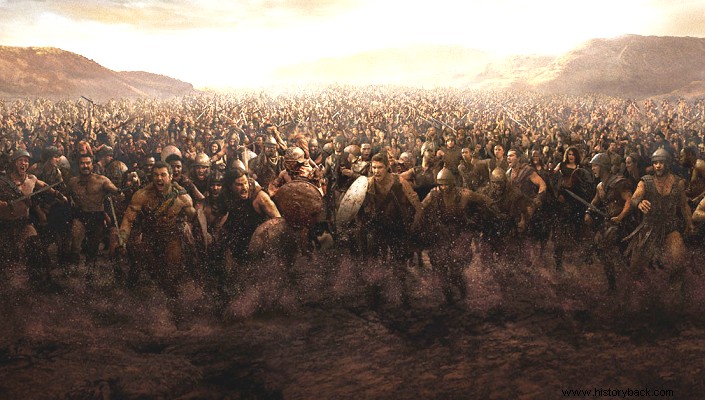
The battle on Mount Vesuvius was the first major conflict of the so-called Third Slave War. It was also the first clash of Spartacus' rebels with regular Roman troops in which the brilliant Thrax showed his strategic genius. Spartacus, according to Plutarch, was a Thrax descended from the race of the Maiden.
He himself mentions about Spartacus:"...he is not only wise and brave, but also because of his prudence and meekness, he owes his fortune, and his race, the Greekest"... He ended up a gladiator in Capia in southern Italy either as a deserter from the Roman army or as a prisoner of war. In 73 BC however, he was put in charge of a rebellion of about 78 gladiators who, armed with table knives and spits, overwhelmed the guards and escaped.
A leading role, alongside Spartacus, was also played by the Gauls Oinomaus and Cryxos . The gladiators plundered the surrounding area, taking revenge on the Romans, but also seizing weapons and freeing slaves. So Spartacus gathered around him a small core force and the most valuable in the fighting part of which were the fugitive gladiators.
Finally, pressed by the Romans, the rebels fled to the steep slopes of the Vesuvius volcano. As the rebellion of Spartacus caused similar phenomena in Campania, Rome could only mobilize immediately. So a force of 3,000 men (about 6 cohorts) was sent under the then praetor Gaius Claudius Glabrion.
Some argue that Glabrion's men were not experienced legionnaires but a sort of loosely organized "militia". Even if things were like this, the Romans were superior in numbers and weapons and in every case. After all, from the strength of Spartacus, only the 78 gladiators could be considered worthy. And for them, however, it was one thing to fight in the arena and another in line-by-line combat with, in any case, a regular division.
Glavrion moved with his men towards Vesuvius and blocked the rebels' only escape route, subjecting them to a peculiar siege. Glabrion reckoned that starvation would compel them to come down and face him and be defeated - as he was certain - or surrender.
Ancient locators
But he reckoned without Spartacus. The latter, knowing the weaknesses of his men and the advantages of his opponent understood that only by acting unorthodox did he have hopes. Thus, studying the terrain, he came up with a "crude" solution... but LOCK!
He and his men cut vines from the vines on Mount Vesuvius which they used to weave strong ropes and windmills. With these they went down on a night when the Romans were carefree. A gladiator stayed behind and lowered them, slowly, their weapons tied to ropes.
Suddenly in the middle of the night the gladiators came dressed in jaches. The Romans were surprised and horrified as the gladiators began to slaughter them without mercy as they themselves expected no mercy. Those Romans who escaped the sword of the gladiators fled in disorderly and shameful flight. The fate of Glavron is not known and no ancient sources refer to him after his defeat. Some argue that he survived in disgrace and disappeared from public view, others say he was killed in battle.
The unenslaved
In any case, Spartacus had triumphed. Only after this defeat did Rome realize the magnitude of the threat and sent a new military force under the praetor Varinius who was also defeated by Spartacus and barely escaped with his head... Arming his men was not a valuable gift to the rebels.
The outcome of Spartacus' revolution is well known and, one might say, largely predetermined as Rome could lose battles but not the war to an army of desperadoes for a number of reasons. However, it is one of the brightest spots in ancient history and the name of the unenslaved Thrace has taken its place in the pantheon of famous warriors who never bowed their heads.
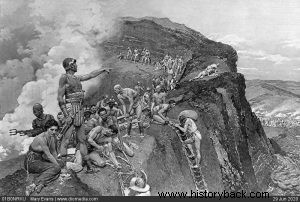
Spartacus and his men on Vesuvius.
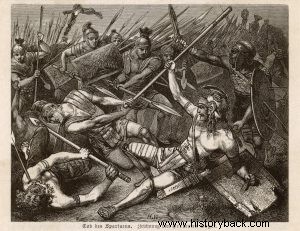
Spartacus dies fighting.
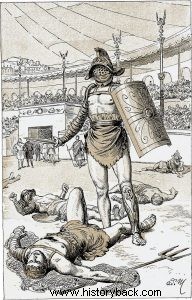
Gladiator in the arena.
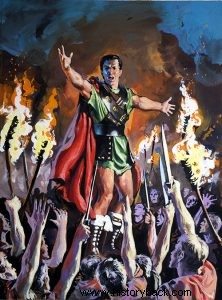
His men deify Spartacus.
